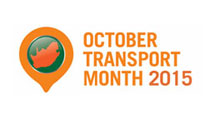[[{"type":"media","view_mode":"media_large","fid":"411574","attributes":{"alt":"Photo of Minister Dipuo Peters","class":"media-image","id":"1","style":"margin-left: 3px; margin-right: 3px; float: left;;","typeof":"foaf:Image"}}]]By Minister Dipuo Peters
Transport is an important catalyst for social and economic development and plays a crucial role in the economy and job creation.
However, we must further leverage the critical role of transport in advancing economic growth and reducing historic inequalities. Transport is a crucial driver of trade, exports and imports. It enables regional integration and is the driver of tourism and human interaction.
October Transport Month became a formal campaign in 2005 during a national Transport Lekgotla. We use this campaign to highlight the strides made in ensuring that all South Africans have access to decent, quality and affordable transport infrastructure and services. This year, we commemorated Transport Month under the theme: “Together we move South Africa Forward.”
This month government highlighted to South Africans various projects, programmes and activities in all the transport modes: Road Transport, Rail Transport, Public Transport, Maritime and Aviation. The Department of Transport, its parastatals, provincial departments and municipalities are together promoting their work in transport, demonstrating how government has been performing on its mandate to deliver transport infrastructure to our people.
The government works with the public to continue promoting road safety as part of the UN Decade of Action for Road Safety 2011-2020 initiative, as road fatalities are a major concern. We remain steadfast in our commitment to reduce road fatalities which remain unacceptably high. Too many lives are lost or destroyed due to reckless driving and other factors.
As a Department of Transport, we continue with our efforts to make transport the heartbeat of the economy and we continue to mobilise public and private sector participation in transport projects aimed at developing the country’s economy and ensuring sustainable job creation.
Given the important role of transport, government invests in the sector and is working to attract young people into the sector. Careers Expos form part of the programme to ensure that we share information about careers in transport with pupils, especially those who live in remote areas.
The Department of Transport has also partnered with 11 universities and 11 Technical Vocational Education and Training colleges to enhance the capacity of the South African society towards the development of a sustainable transportation system for the country.
On the 2nd of November last year, 23 Master’s scholarship recipients had their MSc Degrees conferred by the World Maritime University’s Chancellor and Secretary General of the International Maritime Organisation (IMO), Mr Koji Sekimizu. One of them, Mr Gareth John Courtois, received the degree cum laude and also received the Chancellor’s Award for academic excellence. The 23 MSc degrees were conferred in six maritime fields of specialisation with the total number of graduates reflected as follows:
- Maritime Law and Policy (8)
- Maritime Safety and Environmental Administration (3)
- Maritime Education and Training (2)
- Port Management (1)
- Marine Environmental and Ocean Management (4) and
- Shipping Management and Logistics (5)
Of the 23 students, 15 are males and eight (8) are females. This was made possible by the Department of Higher Education and Training through the funding support provided through its agencies, the National Skills Fund and the National Student Financial Aid Scheme in partnership with the South African Maritime Safety Authority.
The second group of students, 12 had a send-off function in September 2014 and they are all expected to graduate in November 2015. Eight are males and four are females. Seven of the 12 students are from the South African Navy. The twelve 12 students are registered in five maritime fields of specialisation with the total number of students reflected as follows:
- Maritime Education and Training (3)
- Maritime Law and Policy (5)
- Maritime Safety and Environmental Administration (1)
- Marine Environmental and Ocean Management (2)
- Shipping Management and Logistics (1)
Ten students commenced their studies in September and we are confident that they will return with the skills and experience to move our nation forward, especially in the maritime sector.
South Africa has the largest maritime industry on the continent with major shipping lanes passing along the South African coastline in the south Atlantic and Indian oceans.
South African universities will be critical in supplying the critical skills the industry demands in order to grow the economy and create jobs.
South African National Roads Agency Limited (SANRAL) continues to be at the forefront of improving the country’s roads. Investments such as the multibillion-rand freeway improvement scheme, implemented in Gauteng in 2007, had significantly eased congestion on the province’s roads.
South Africa's future lies in being able to move people and goods faster, efficiently and in a profitable manner.
The government wishes to encourage all stakeholders and the public to continuing playing an active role beyond October Transport Month. We can only succeed in this venture if all of us work together - government across all tiers, business big and small, civil society and all formations of our people.
Dipuo Peters is Minister of Transport.





